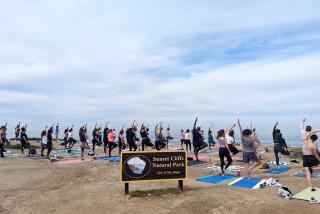Permit Denied : Buddhists Lose Bid for Meditation Center
A group of Buddhists from Thailand, complaining of “religious discrimination” after the county Board of Supervisors rejected their plan to build a meditation center in the La Puente area, is considering whether to sell or fight.
The board, led by an obstreperous Supervisor Pete Schabarum, voted to deny a conditional-use permit to the Natural Buddhist Meditation Center. The move in effect denies the group the use of its land except for residential purposes.
Schabarum lashed into fellow supervisors and spokesmen for the Buddhists because of their suggestion that the issue was a religious one.
“You’re dead wrong, and you don’t know what you’re doing--but that’s not unusual,” Schabarum told Supervisor Ed Edelman, who had raised the religion issue. Edelman eventually voted against the plan, as did Deane Dana and Schabarum, who represents the unincorporated La Puente area. The other two supervisors were absent for the vote.
Other Churches Approved
Proponents of the plan pointed out that the board in recent years had approved three Christian churches within several blocks of the Buddhists’ land at 14036 Don Julian Road, south of Bassett.
“They’re prejudiced,” said Ven H. Ratanasara, president of the American Buddhist Congress, who flew to Los Angeles from Colorado to be at the board meeting. “It’s very clear.”
But Schabarum insisted that his reasons for denying the permit were exclusively related to “land-use principles.”
“To even insinuate that it is (a religious issue) is nonsense,” the supervisor said.
Schabarum aide Mark Volmert conceded that the board had approved three churches in the area since 1978, two of them in 1985. “But all are located at major intersections,” he said. The Buddhist land is at a mid-block location, creating possible traffic complications, he said.
Volmert added that the board last year rejected a proposed Russian Orthodox church on a nearby site because it was at the end of a cul-de-sac.
“Mid-block locations raise questions about access and egress,” Volmert said.
“It was exactly the same issue,” Schabarum said.
The Thai group, after buying the five-acre plot two years ago, alienated many of its neighbors when members of the congregation began playing loud, amplified chimes every morning at 7 and marching barefoot through the streets, chanting blessings. They also conducted religious services without obtaining a required county permit.
“This group of folks started out on a very bad foot in the neighborhood, conducting activities that were clearly in violation of the law,” Schabarum said.
But Jack Spahn, the group’s paid spokesman, said the Buddhists had desisted from all of those practices. The group, which numbers about 100, now conducts its services at a nearby public school.
Asserting that there is only one other Thai Buddhist facility in the county, Spahn suggested that the board allow the group to operate for one year. “If they mess up, throw them out,” he said.
Warren Bates, a neighbor of the Buddhists, testified that group members were “very friendly people, just noisy.” Bates, who owns a nearby gasoline station, said the group disrupted the neighborhood with traffic and kitchen noises. The group at one time washed dishes in an outside sink, which has since been removed.
“There are delivery trucks, vans . . .” he said. “It’s quite irritating on a constant basis. These people are open all the time.”
But another neighbor, Carmelo Cortez, said that Christian churches were even more disruptive. “They sing in the morning, they sing in the afternoon,” Cortez said of one nearby Christian church. “The (Buddhist) temple has about 70 parking spots, but the church only has facilities for 10 or 15. That means they all park on the street.”
Considering Options
The Buddhists, in a quick hallway meeting after the decision, discussed their options. They can sell the property, revise their plans for a meditation center and submit it anew or reapply with the current plan in a year while continuing to use it as a residence.
If the group elects to sell, developers could build 10 single-family homes on the property, according to existing zoning. Three Buddhist monks now live in a house on the land, with an attached garage that has been converted into a small temple.
More to Read
Sign up for Essential California
The most important California stories and recommendations in your inbox every morning.
You may occasionally receive promotional content from the Los Angeles Times.










